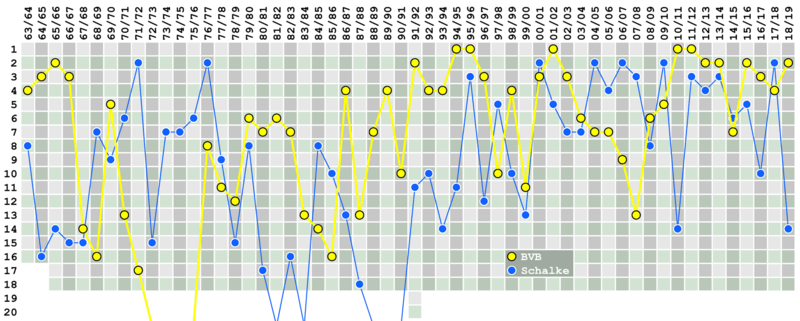FC Schalke 04
Fußballclub Gelsenkirchen-Schalke 04 e. V., commonly known as FC Schalke 04 (German: [ɛf tseː ˈʃalkə nʊl fiːɐ̯]), Schalke, Schalke 04 or abbreviated as S04 (German: [ˈɛs nʊl fiːɐ̯]), is a professional German football and multi-sports club originally from the Schalke district of Gelsenkirchen, North Rhine-Westphalia. The "04" in the club's name derives from its formation in 1904. Schalke has long been one of the most popular professional football teams and multi-sports club in Germany, even though the club's heyday was in the 1930s and 1940s. Schalke play in the Bundesliga, the top tier of the German football league system. As of June 2018, the club has 155,000 members, making it the second-largest sports club in Germany[4] and the fourth-largest sports club in the world in terms of membership. Other activities offered by the club include athletics, basketball, handball, table tennis, winter sports and eSports.
 | ||||
| Full name | Fußballclub Gelsenkirchen-Schalke 04 e.V. | |||
|---|---|---|---|---|
| Nickname(s) | Die Königsblauen (The Royal Blues) Die Knappen (The Miners) | |||
| Short name | S04 | |||
| Founded | 4 May 1904 | |||
| Ground | Veltins-Arena, Gelsenkirchen | |||
| Capacity | 62,271[1] | |||
| President | Clemens Tönnies[2] | |||
| Executive Board | Alexander Jobst[3] Peter Peters[3] Jochen Schneider[3] | |||
| Head coach | David Wagner | |||
| League | Bundesliga | |||
| 2018–19 | 14th | |||
| Website | Club website | |||
|
| ||||
| Departments of Schalke 04 | ||
|---|---|---|
| Football | Basketball | Handball |
| Blind football | Table tennis | Athletics |
| Esports | ||
Founded in 1904, Schalke has won seven German championships, five DFB-Pokals, one DFL-Supercup and one UEFA Cup. Schalke also succeeded as the first German club to win a cup double in 1937.
Since 2001, Schalke's stadium has been the Veltins-Arena. Schalke holds a long-standing rivalry with Ruhr neighbours Borussia Dortmund, arguably one of the most widespread and well-known rivalries in German football, and matches between the two teams are referred to as the Revierderby.
Schalke was ranked as the 31st-best football team in Europe by UEFA's 2020 UEFA club rankings,[5] and ranked 7th-best in 2015 UEFA club rankings.[6]
In terms of operating income, Schalke possesses the seventh-highest operating income of any football club at $64.4 million or £38.2 million (€48 million),[7] and 0 per cent debt as of August 2014.[8] Schalke also generates the 14th-highest revenue of any football club, at "$265.6 million or £157.8 million (€198 million)".[8]
In May 2014, Schalke 04 were ranked by Forbes magazine as the 14th-most valuable football club,[7] at "£355 million or $599 million (€446 million)", an increase of 16% from the previous year.[8]
History
Schalke's early years
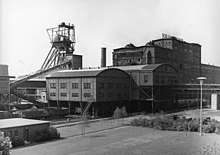
The club was founded on 4 May 1904 as Westfalia Schalke by a group of high school students and first wore the colours red and yellow. The team was unable to gain admittance to the Westdeutscher Spielverband (Western German Football Association) and played in one of the "wild associations" of early German football. In 1912, after years of failed attempts to join the official league, they merged with the gymnastic club Schalker Turnverein 1877 in order to facilitate their entry. This arrangement held up until 1915, when SV Westfalia Schalke was re-established as an independent club. The separation proved short-lived and the two came together again in 1919 as Turn- und Sportverein Schalke 1877. The new club won its first honours in 1923 as champions of the Schalke Kreisliga. It was around this time that Schalke picked up the nickname Die Knappen, from an old German word for "miners" because the team drew so many of its players and supporters from the coal miners of Gelsenkirchen.
In 1924, the football team parted ways with the gymnasts again, this time taking the club chairman along with them. They took the name FC Schalke 04 and adopted the now familiar blue and white kit from which their second nickname would derive, Die Königsblauen (English: The Royal Blues). The following year, the club became the dominant local side, based on a style of play that used short, sharp, man-to-man passing to move the ball. This system would later become famous as the Schalker Kreisel (English: spinning top; gyroscope). In 1927, it carried them into the top-flight Gauliga Ruhr, onto the league championship, and then into the opening rounds of the national finals.
Rise to dominance
The popular club built a new stadium, the Glückauf-Kampfbahn, in 1928, and acknowledged the city's support by renaming themselves FC Gelsenkirchen-Schalke 04. They won their first West German championship in 1929, but the following year were sanctioned for exceeding salary levels set by the league and, in an era that considered professionalism in sport to be anathema, found themselves banned from play for nearly half a year.
However, the ban had little impact on the team's popularity: in their first match after the ban against Fortuna Düsseldorf, in June 1931, the team drew 70,000 spectators to its home ground. The club's fortunes begun to rise from 1931 and they made a semi-final appearance in the 1932 German championship, losing 1–2 to Eintracht Frankfurt. The year after, the club went all the way to the final, where Fortuna Düsseldorf proved the better side, winning 3–0.[9]
With the re-organisation of German football in 1933 under Nazi Germany, Schalke found themselves in the Gauliga Westfalen, 1 of 16 top-flight divisions established to replace the innumerable regional and local leagues, all claiming top status. This league saw Schalke's most successful decade in their history: from 1933 to 1942, the club would appear in 14 of 18 national finals (ten in the German championship and eight in the Tschammerpokal, the predecessor of today's DFB-Pokal) and win their league in every one of its eleven seasons.
The club never lost a home match in the Gauliga Westfalen in all these 11 seasons and only lost six away matches, while remaining unbeaten in the 1935–36, 1936–37, 1937–38, 1938–39, 1940–41 and 1942–43 seasons, a sign of the club's dominance.[10]
The championship years (1934–42)
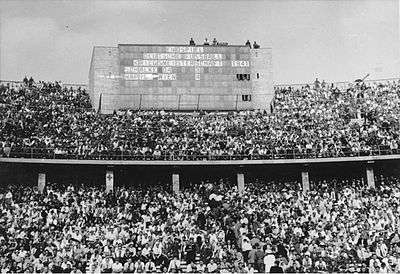
Schalke's first national title came in 1934 with a 2–1 victory over favourites 1. FC Nürnberg. The next year, they successfully defended their title against VfB Stuttgart with a 6–4 win. The club missed the 1936 final, but would make appearances in the championship match in each of the next six years, coming away victorious in 1937, 1939, 1940 and 1942. Three of those national finals were against Austrian teams – Admira Wien, Rapid Wien and First Vienna – which played in Germany's Gauliga Ostmark after Austria's incorporation into the Reich through the 1938 Anschluss.
Die Königsblauen also made frequent appearances in the final of the Tschammerpokal, but enjoyed much less success there. They lost the inaugural Tschammerpokal 0–2 to 1. FC Nürnberg in 1935. They also made failed appearances in the 1936, 1941, and 1942 finals with their only victory coming in 1937 against Fortuna Düsseldorf.
Over a dozen seasons, from 1933 to 1945, Schalke won 162 of 189 Gauliga matches, drawing 21 and losing only 6. Within this period, they scored 924 goals and conceded just 145. From 1935 to 1939, they did not lose a single league match. The club's dominance throughout this period led them to be held up for propaganda purposes by the Nazi regime as an example of "new Germany".
Post-war football
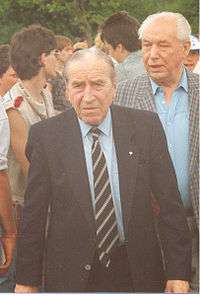
With Germany in chaos towards the end of World War II, Schalke played just two matches in 1945. They resumed regular play following the war and, for a time, continued to compete as a strong side. They set a record in a national championship round match with a 20–0 drubbing of SpVgg Herten, but that spoke more to the weakened condition of German football than to the ability of the team. Schalke's play fell off and the best they could manage in the new Oberliga West in 1947 was a sixth-place finish. Within two years, they slipped to 12th place.
It would take Schalke until the mid-1950s to recover their form. They finished third in a tight three-way race for the 1954 Oberliga West title, decided on the last day of the season. The following year, they appeared in the DFB-Pokal final, where they lost 2–3 to Karlsruher SC. The club's next, and to date last, German championship came in 1958 with a 3–0 victory over Hamburger SV. The strong fanbase of the club is as well documented in a local church, St. Joseph, in Gelsenkirchen. It was renovated shortly after the 1958 victory, where one of the glass windows shows Aloysius Gonzaga with a football and the dress and colors of Schalke.[11]
Entry to the Bundesliga
Schalke continued to play well, delivering a number of top four finishes in the years leading up to the 1963 formation of the Bundesliga, West Germany's new federal, professional league. Those results earned them selection as 1 of 16 clubs admitted to the top-flight league.
Their first years in the Bundesliga were difficult. In 1964–65, they escaped relegation only through the expansion of the league to 18 teams. A number of finishes at the lower end of the league table followed, before a marked improvement in 1971–72, culminating in a second-place finish to Bayern Munich and after having led the league for much of the season. In the same season, Schalke won the DFB-Pokal for the second time in its history.
The Bundesliga scandal of 1971
Despite their improved results, the seeds of a major reversal had already been sown. A number of the team's players and officials were accused of accepting bribes as part of the widespread Bundesliga scandal of 1971. Investigation showed that Schalke had deliberately played to lose their 17 May, 28th-round match against Arminia Bielefeld, 0–1. As a result, several Schalke players were banned for life, including three – Klaus Fischer, "Stan" Libuda and Klaus Fichtel – who regularly played for the West Germany national team at the time.
Even though the penalties were later commuted to bans ranging from six months to two years, the scandal had a profound effect on what might have possibly become one of the dominant German teams of the 1970s.
Crisis and recovery

In 1973, the club moved to the Parkstadion, newly built for the 1974 FIFA World Cup and having a capacity of 70,000 spectators. In the wake of the scandal, the club's performance was uneven. They managed another second-place result in 1976–77, finishing just one point behind champions Borussia Mönchengladbach.
In the early 1980s, Die Knappen ran into trouble and found themselves relegated to the second division of the Bundesliga for the 1981–82 season and, after promotion, again in 1983–84. They returned to the top flight in 1984 but slipped once more to the second tier in 1988. They returned to the Bundesliga in the 1991–92 season and have stayed in the top flight ever since.
The club earned their first honours since the DFB-Pokal win of 1972 with a victory in the final of the 1996–97 UEFA Cup over Inter Milan on penalties. Coached by the Dutch coach Huub Stevens, the 1997 Schalke squad earned the nickname "Euro Fighters", which is still in use among fans. Stevens, who was widely unknown in Germany at the time, quickly earned himself a cult following among the Schalke supporters.
Stevens successfully implemented a system of rigid discipline, especially in the defence. His motto "Die Null muß stehen" (in English, "It has to read nil"), which emphasized his importance on his side not conceding any goals, has found its way into everyday language in Germany.
The turn of the millennium has seen much stronger performances from Schalke. During the 1990s and early 2000, the club underwent a successful transformation into a modern, commercial sports organization and established itself as one of the dominant teams of the Bundesliga. Schalke captured consecutive DFB-Pokals in 2000–01 and 2001–02, and earned second-place finishes in the Bundesliga in 2000–01, 2004–05 and 2006–07. The 2000–01 season finish was heartbreaking for Schalke's supporters as it took a goal in the fourth minute of injury time by Bayern Munich away to Hamburger SV to snatch the title from Die Königsblauen.
 Gerald Asamoah, longtime Schalke player with over 250 matches in over 11 years
Gerald Asamoah, longtime Schalke player with over 250 matches in over 11 years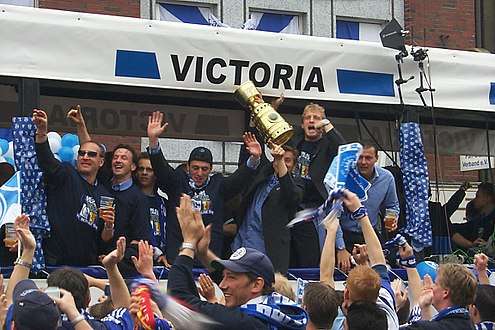 Schalke players celebrate winning the DFB-Pokal in 2002
Schalke players celebrate winning the DFB-Pokal in 2002
Current

The last few years have been more successful for Schalke, who finished in the second place in 2005, a result that led to Schalke making its second appearance in the UEFA Champions League. There, Schalke finished in third place during the group stage and continuing into the UEFA Cup, where they were eliminated by the eventual winners Sevilla in the semi-finals. In 2005–06, Schalke finished in fourth place in the Bundesliga and a year later they again finished as runners-up for the third time in seven seasons.
In the 2007–08 season, Schalke progressed past the Champions League group stage for the first time and advanced to the quarter-finals after defeating Porto on penalties in the round of 16. They were eliminated by Barcelona in the quarter-finals, losing both home and away matches 0–1.
On 9 October 2006, Russian oil company Gazprom became the club's new sponsor. The company stated it expected to invest as much as €125 million in the club over a five-and-a-half-year period.[12] Gazprom's sponsorship has been seen by some analysts as a politically motivated attempt to buy friendship in Germany.[13] Within this sponsorship, Schalke 04 and Zenit Saint Petersburg signed a "partnership agreement"; both clubs intend to work closely on improving football-related issues.
On 13 April 2008, the club announced the dismissal of manager Mirko Slomka after a heavy defeat at the hands of Werder Bremen and elimination from the Champions League. Former players Mike Büskens and Youri Mulder were put in charge of the first team on an interim basis.
For the 2008–09 Bundesliga season, Schalke signed a new head coach, Fred Rutten, previously of Twente. Rutten signed a contract running until June 2010.[14] In March 2009, Rutten was sacked and, once more, Mike Büskens, Youri Mulder and Oliver Reck took over the helm.
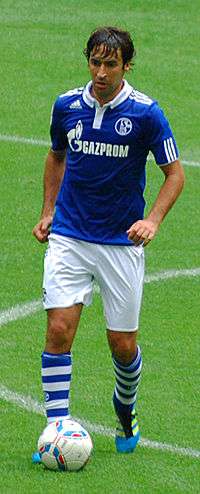
On 1 July 2009, Felix Magath, who had led VfL Wolfsburg to the top of the table in the Bundesliga, became head coach and general manager of the Königsblauen. The appointment of Magath as manager coincided with a multimillion-euro spending spree, allowing Schalke to acquire internationally-known forwards Klaas-Jan Huntelaar and Raúl. Magath's tenure at the club was initially successful, seeing the side score a glut of goals in the first few months of the season, though defensive frailties and Magath's questionable squad selection had made him unpopular with Schalke supporters by December 2010. On 16 March 2011, Magath was sacked and replaced with Ralf Rangnick, who previously, between 2004 and 2005, had a brief spell being in charge of the team. Within just weeks of his appointment, Rangnick masterminded a 5–2 victory over Inter Milan at the San Siro during the quarter-finals of the Champions League. Schalke advanced to the semi-final where they lost 2–0 to Manchester United in the first leg and 4–1 in the second leg.[15]
On 22 September 2011, Ralf Rangnick announced his immediate resignation as head coach of Schalke 04 due to long-term exhaustion.[16] Assistant coach Seppo Eichkorn coached the team as interim manager until the appointment of Huub Stevens on 27 September 2011. Stevens' contract was to run until 30 June 2013.[17]

Despite having legendary status among Schalke supporters, Stevens' return to Schalke was met with some scepticism as fans feared that Stevens, who coached Schalke to the 1997 UEFA Cup win with a rigidly defensive system, could abandon Rangnick's system of attacking play in favour of returning to his 1997 defensive antics.[18] The doubts of the supporters proved unfounded. Although Schalke played a somewhat inconsistent season, they reached third place in the Bundesliga and therefore direct qualification for the UEFA Champions League.
Schalke had an excellent start to the 2012–13 Bundesliga season, and worked their way to second place in the league by November, just behind Bayern Munich. On 20 October, Schalke traveled to Borussia Dortmund for matchday 8, and were able to defeat the home side 2–1 to secure their first league Revierderby win since February 2010 while securing a Champions League place by finishing in fourth place.
In the 2013–14 UEFA Champions League group stage, Schalke's opponents were FCSB, FC Basel and Chelsea F.C.. Schalke ultimately finished the group stage in second place, behind Chelsea, and was eliminated in the round of 16 by Real Madrid CF.
The most prominent Schalke addition was the arrival of Kevin-Prince Boateng from Milan.[19] After a disappointing first round of the 2013–14 Bundesliga that saw Schalke in seventh place in the Bundesliga table, as well as an early exit from the 2013–14 DFB-Pokal in the first knockout round, the club played their most successful second half of the season in club history. The season was marked by a glut of injuries to key squad players, including Jefferson Farfán and Klaas-Jan Huntelaar, for almost the entire season. It also led to performance related discussions about head coach Jens Keller. Partially, Schalke fielded up to ten young players with potential who played in the Schalke youth system throughout the season. Among the brightest young player discoveries of the 2013–14 season were Max Meyer and Leon Goretzka. The young Schalke squad won 11 out of 17 matches, totalling 36 points. At the end of the 2013–14 season, the club finished in third place in the Bundesliga table to qualify for their third-straight UEFA Champions League appearance, a feat Schalke had never before achieved.
On 7 October 2014, after a 1–2 defeat to 1899 Hoffenheim and after amassing just eight points from seven matches, Keller was sacked and succeeded by Roberto Di Matteo.[20]

Sponsors and finances
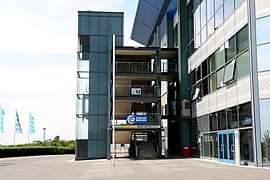 Exterior of the S04 museum at the S04 Veltins-Arena
Exterior of the S04 museum at the S04 Veltins-Arena Restaurants at the S04 Veltins-Arena
Restaurants at the S04 Veltins-Arena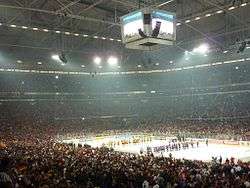 Ice hockey events are hosted at the S04 Veltins-Arena
Ice hockey events are hosted at the S04 Veltins-Arena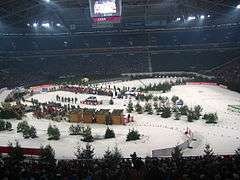 Biathlon and a variety of winter sport events are hosted at the S04 Veltins-Arena
Biathlon and a variety of winter sport events are hosted at the S04 Veltins-Arena
The headline sponsors of Schalke 04 are the China-based electronics manufacturer Hisense and the Russia-based hydrocarbon giant Gazprom.[21] Additional sponsors include Germany-based insurance group ERGO Insurance Group; Germany-based automotive manufacturer BMW; Germany-based motorcycle manufacturer BMW Motorrad; Spanish-based security insurance company Reale Seguros; China-based telecommunications company Huawei; cyber gambling and sports betting company bet-at-home.com; beverage company Coca-Cola; Germany-based brewery Veltins; and the current manufacturer of Schalke's squad kits, Germany-based Adidas.[21]
In terms of operating income, Schalke possesses the seventh-highest operating income of any football club in the world at €48 million,[7] and 0% debt as of August 2014.[8] Schalke generates the 12th-highest revenue of any football club in the world at €198 million.[8]
In May 2014, Schalke 04 were ranked by Forbes magazine as the 12th-richest football club in the world,[7] at €446 million, an increase of 16% from the previous year.[8]
Players
Current squad
Note: Flags indicate national team as defined under FIFA eligibility rules. Players may hold more than one non-FIFA nationality.
|
|
Out on loan
Note: Flags indicate national team as defined under FIFA eligibility rules. Players may hold more than one non-FIFA nationality.
|
|
Reserve team
Notable former players

In the year 2000, the supporters voted for Schalker Jahrhundertelf, the "Team of the Century":[25]
Note: Flags indicate national team as defined under FIFA eligibility rules. Players may hold more than one non-FIFA nationality.
|
|
Records
- As of 1 October 2017[26]
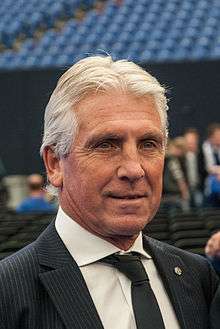
|
|
Kit choices
| Type | Shirt | Shorts | Socks | First appearance / Info | Club Crest |
|---|---|---|---|---|---|
| Home | Blue | White | Blue |  S04 crest since 1995 | |
| Home Alt. | Blue | Blue | Blue | ||
| Away | White | Blue | White | ||
| Away Alt. | White | White | White | ||
| Third | Black and Green | Green | Green | → International Kit |
Home
|
Home Alt.
|
Away
|
Away Alt.
|
Third
|
Stadium
Schalke's stadium, known as the Veltins-Arena under a sponsorship agreement with Veltins brewery, was built in the summer of 2001 and has a capacity of 62,271 spectators.[1] Schalke regularly draws sell-out crowds to what is widely regarded as one of the most modern and best multi-use facilities in Europe. The facility was previously known as the Arena AufSchalke and replaced the Parkstadion (capacity of 62,000) built in 1973. Prior to this, the club played its matches in the Glückauf-Kampfbahn, constructed in 1928 with a capacity of 35,000. The facility was used for amateur matches during its later years with a reduced capacity of just 5,000.
 An interior design panorama of the Veltins-Arena
An interior design panorama of the Veltins-Arena Exterior of the Veltins-Arena
Exterior of the Veltins-Arena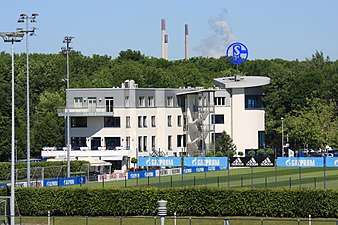 Training ground of FC Schalke 04 known as the Geschäftsstelle
Training ground of FC Schalke 04 known as the Geschäftsstelle
Fan culture

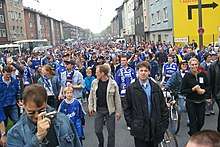
The number of members of Schalke 04 grew from 10,000 in 1991 to 155,000 in 2018. This figure makes Schalke 04 the second-biggest sports club in Germany and fourth-biggest sports club in the world, behind Bayern Munich, Sporting Lisbon and first-placed Benfica. Schalke 04 has the fourth-largest fan-base of any team in the world. Schalke is currently ranked as the thirty-first-best football club in Europe and in Continental Europe by UEFA's UEFA club rankings.[27] A representation of the Schalke 04 membership structure in 2014 showed, among other things, a female share of 20% and a share of the age group up to ten years of 14%.[28] Around 30% of the members were not from North Rhine-Westphalia. Apart from Gelsenkirchen (10,197 members) and its immediate neighboring towns, the members of Schalke 04 also come from more distant cities such as Cologne (1,117), Berlin (932) and Dortmund (800).[28] This high growth in Schalke 04 membership is also promoted by promotions of Schalke 04, as from 2013 to further "advertise Schalke 04 brand".[28][29]
On 21 August 2013, Schalke 04 played their first home match of the 2013–14 season, a UEFA Champions League qualifier at the Veltins-Arena against the Greek runners-up PAOK (led by former head coach Huub Stevens), drawing 1–1.[30] The match and result was more than overshadowed by a controversial police operation in the "S04 Ultras Gelsenkirchen" block of the Veltins-Arena against the fans of the home team with nearly 80 of the home team's fans injured.[30] The return match was won 3–2 by Schalke without any of their supporters allowed to attend the match.[30]
Schalke 04 Fan Club Association
Schalke 04 Fan Club Association (SFCV) is an umbrella organization, according to their own statement, has an estimated 1,500 fan clubs.[31] Of those listed by the SFCV, 860 Schalke 04 fan clubs (October 2012) in which an estimated 200 were in Ruhr, 360 in the rest of North Rhine-Westphalia and 300 in the other federal states.[32] A member of the board of SFCV has a permanent seat on the board of FC Schalke 04 and in 2013 SFCV merged with the "Ultras Gelsenkirchen" and later the supporters' club, Schalke Fan-Initiative eV with several members of strong fan groups from the SFCV, as is clear from the merger of the SFCV with the fan section of S04 has not adequately represented the fan interests.[33][34]
Friendships

The fan-base of Schalke is connected, in a friendly way, with the supporters of 1. FC Nürnberg and Dutch club Twente. The friendship with Nürnberg is the oldest connection between two fan-bases in Germany. Before a match between both clubs, the official club songs are played.
Club songs
- Blau und weiß, wie lieb ich Dich ("Blue and White, How I Love You") is the official club song.
- Das Steigerlied, traditional German mining song, play before every match.
- Blau und Weiß ein Leben lang ("Blue and white a life-long") is the goal tune.
- Königsblauer S04 ("Royal Blue S04") played after every match
Popular unofficial chants are
- Der Mythos vom Schalker Markt ("The Myth of the Schalke Market"),
- Opa Pritschikowski ("Grandpa Pritschikowski"),
- Von der Emscher bis zum Bosporus ("From the Emscher to the Bosphorus"),
- Wir schlugen Roda... ("We beat Roda..."),
- Die Eurofighter sind wieder da ("The Eurofighter are back again"),
- Für deine Farben leben und sterben wir ("For your colours we live and die"),
- Wir lieben alle nur den FC Schalke ("We all love only FC Schalke"),
- Wir sind die Fans ("We are the fans"),
- Hurra wir sind die Schalker Knappen ("Hurray we are the Schalke Knappen"),
- Kohle unter unser'n Füßen ("Coal under our feet"), and
- Steht auf, wenn ihr Schalker seid ("Stand up if you're Schalke"), sung to the melody of "Go West" by the Pet Shop Boys (itself a cover of a Village People song).
Revierderby
The Revierderby is the rivalry between local clubs Schalke 04 and Borussia Dortmund, both situated in the densely populated Ruhr region. Because of the small geographical distances between the clubs (roughly 30 kilometers), fans of opposing clubs often meet in everyday life. The term may be used in any match between two football clubs of the Ruhr region (such as VfL Bochum, Rot-Weiss Essen or MSV Duisburg), but the term is most commonly associated with the rivalry between Schalke and Dortmund due to the derby's popularity and prestige. To some fans, the win of the derby itself is more important than the actual performance in the Bundesliga.
In popular culture
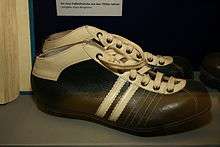
Schalke has been subject of a feature-length film called Fußball ist unser Leben ("Football is our life"), shown in 1999. Actors Uwe Ochsenknecht and Ralf Richter, both of whom were in the award-winning film Das Boot played the main roles, while many persons associated with Schalke had cameo roles, such as manager Rudi Assauer, coaches Huub Stevens and Helmut Schulte, and player Yves Eigenrauch. Also featured were prominent fans like Manfred Breuckmann, Ulrich Potofski or DJ Hooligan.[35] The film is a comedy about "Hans", a Schalke fanatic, and his three pals who somehow get involved in kidnapping and trying to bring back to form the team's new star player "Di Ospeo" and in the process bet Hans' house that their idol will score in the final match.[35] Some critics considered Football is our life to be "one of the worst German comedies ever".[35]
"Schalke" is mentioned in the film Das Boot when the bosun tells the crew in their ward room, "I got bad news for you men. Schalke lost 5–0, looks like we won't be in the final this year."
Honours
Domestic

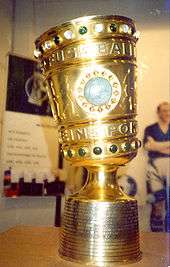
DFB-Ligapokal/German League Cup
- Winners: 2005
- Winners: 2011
UEFA club coefficient ranking
- As of 22 August 2019[38]
| Rank | Nation | Team | Points |
|---|---|---|---|
| 22 | Villarreal | 68.000 | |
| 23 | Dynamo Kyiv | 65.000 | |
| 24 | Schalke 04 | 63.000 | |
| 25 | Beşiktaş | 62.000 | |
| 26 | Monaco | 62.000 |
Youth
- Domestic
- Winners: 1976, 2006, 2012, 2015
- Runners-up: 1975, 1980, 1981
- Winners (5): 2006, 2012, 2013, 2014, 2015
- Winners: 1978, 2002
- Runners-up: 1977, 1980
- Winners: 2013
Double
- 1937: Championship and Cup
Corporate structure
- As of 1 July 2019
| ||||||||||||||||||||||||||||||||||||||||||||||||||||||||||||||||||||||
Notable managers
| Name | Nationality | From | To | Honours |
|---|---|---|---|---|
| Hans Schmidt | 1 July 1933 | 12 June 1938 | 3 German championships (1934, 1935, 1937) German championship runners-up (1933, 1938) 5 Gauliga Westfalen championships (1934, 1935, 1936, 1937, 1938) 1 Tschammerpokal (1937); runners-up (1935, 1936) | |
| Otto Faist | 13 July 1938 | 31 December 1942 | 3 German championships (1939, 1940, 1942) German championship runners-up (1941) 4 Gauliga Westfalen championships (1939, 1940, 1941, 1942) Tschammerpokal runners-up (1941, 1942) | |
| Ernst Kuzorra | 1 July 1946 | 30 September 1947 | ||
| Fritz Szepan | 1 July 1949 | 30 June 1954 | 1 Oberliga West championship (1951); runners-up (1952) | |
| Edi Frühwirth | 1 July 1954 | 30 June 1959 | 1 German championship (1958) 1 Oberliga West championship (1958); runners-up (1956) DFB-Pokal runners-up (1955) | |
| Ivica Horvat | 1 July 1971 | 30 June 1976 | Bundesliga runners-up (1971–72) 1 DFB-Pokal (1971–72) | |
| Huub Stevens | 8 October 1996 | 30 June 2002 | Bundesliga runners-up (2000–01) 2 DFB-Pokals (2000–01, 2001–02) 1 UEFA Cup (1997) DFB-Ligapokal runners-up (2001, 2002) | |
| Felix Magath | 1 July 2009 | 16 March 2011 | Bundesliga runners-up (2009–10) 1 DFL-Supercup (2010) |
S04 other departments
Women's football
In women's football, FC Schalke 04 have achieved some notable successes in the late seventies and early eighties of the 20th century. The S04 women's team was five times Westphalia champion and twice cup winners as well as competing in the German Championship and in the DFB Cup ended up being each in the first round. Mid-nineteen eighties, the S04 women's team was dissolved. Since the 2007–08 season, S04 is cooperating with the women footballers of the second division 1 FFC Recklinghausen.[41]
Basketball
The basketball department of FC Schalke 04 played in the 1988–89 season in the National Basketball League Basketball Bundesliga and from 2004 for several seasons in the ProA, the second highest basketball league in Germany.[42] 2009 saw the Schalke 04 voluntary withdrawal of Schalke 04 from the ProA. Currently, the Schalke 04 basketball department competes in the ProB.[43]
Blind football
This department was founded in 2015. The squad plays in the National Blind Football League (Blindenfußball-Bundesliga).[44]
Handball
The handball department of FC Schalke 04 was founded in 1926. In 1929 it competed in the Gaumeister prior to competing in the Gauliga until the end of the Third Reich, the then top division. After the Second World War, except for a few years in the league, the S04 handball department did not build on the successes. Currently the S04 handball department competes in the national league.[45]
Athletics
The athletics department of FC Schalke 04 was founded in 1922. Famous members were multiple German champion in sprint such as Erika Rost; and the winner of the silver medal in the decathlon at the 1996 Olympic Games, Frank Busemann; and the 2003 European Athletics Junior Championships gold in 200 metres, Sebastian Ernst.[46]
Table tennis
The table tennis department of FC Schalke 04 was founded in 1947. In the 1952–53 season, the FC Schalke 04 table tennis department competed for a year in the big leagues, up unto the foundation of the table tennis Bundesliga in 1966, the top division in Germany. In the 2013–14 season S04 table tennis department competed in the Westphalia district league. The FC Schalke 04 table tennis department women's team was one of the early participants in the 1950s in the national league, until it was withdrawn in 1956.[47]
Esports
In 2016, Schalke opened an esports department and acquired League of Legends team Elements, becoming the second professional sports team with a League of Legends division after Beşiktaş acquired the roster of Turkish team Aces High the previous year. In early June, they debuted in the European League of Legends Championship Series, officially organized by developer Riot Games and the top level of professional League of Legends competition in Europe.[48] The club also announced former Rot-Weiß Oberhausen and Sportfreunde Siegen midfielder and SK Gaming co-founder Tim Reichert as Head of ESport.
Bibliography
- Bodo Berg: More than a game: from the life of a football fan; with photos of Yves own smoke. Verlg the workshop, Göttingen 2000, ISBN 3-89533-299-2.
- Jenrich Burkh: Royal Blue Planet, Göttingen 2004, ISBN 3-89533-446-4.
- Stefan Goch / Norbert Silver Bach: Between blue and white is gray, Essen 2005, ISBN 3-89861-433-6.
- Hardy Green: Faith, Love, Schalke. The complete history of FC Schalke 04, The Workshop, Göttingen 2011, ISBN 978-3-89533-747-5.
- Helmut Wood: Schalke is priceless, Gelsenkirchen, 1991, ISBN 3-924984-30-1 .
- Helmut Wood: Schalke smile. Curiosities and concrete of fans and dreamers – experienced and collected, Gelsenkirchen 1984, ISBN 3-9800764-6-6.
- William Herbert Koch: The Royal Blues: the phenomenon Schalke 04, Düsseldorf 1973, ISBN 3-7700-0365-9.
- Olivier Kruschinski: Blue and white for a lifetime. A season with Schalke, Herten 2005, ISBN 3-938152-04-4.
- Georg Röwekamp: The legend lives on. The history of FC Schalke 04, Göttingen 1996 [and newer edition], ISBN 3-89533-164-3.
- Schalke Fan Initiative (Eds.), The tip of the Eichbergs. Most scandals of FC Schalke 04. plain text, Essen 2005, ISBN 3-89861-393-3.
- Jörg Seven Eick, Thomas Spiegel, Gerd Voss (Eds.): 100 Schalke years – 100 stories Schalke. Plain text, Essen 2004, ISBN 3-89861-321-6.
References and notes
- "Schalke erhöht Stadionkapazität". kicker.de (in German). kicker. 30 June 2015. Retrieved 20 July 2015.
- "Supervisory Board". FC Schalke 04.
- "Managing Board". FC Schalke 04.
- "fc schalke". 11 November 2018. Retrieved 11 November 2018.
- "UEFA Team Ranking 2020". kassiesa.home.xs4all.nl. Retrieved 2 March 2020.
- "UEFA Team Ranking 2015". kassiesa.home.xs4all.nl. Retrieved 26 August 2014.
- "Soccer Team Values". Forbes. May 2014. Retrieved 1 August 2014.
- "Schalke 04". Forbes. May 2014. Retrieved 1 August 2014.
- kicker Almanach 1990 (in German), publisher kicker, published: 1989, page: 171
- "Die deutschen Gauligen 1933–45 – Heft 1–3" (in German). DSFS. Cite journal requires
|journal=(help) - zur Nieden, Felix (12 July 2011). "Der Fußball-Heilige wacht über die St.-Joseph-Kirche in Schalke". WAZ (in German). Retrieved 6 February 2016.
- "145,000 see 'German Newcastle' blow it". The Guardian. 13 May 2007.
- Boyes, Roger (7 January 2009). "Comment: Gazprom is not a market player, it's a political weapon". The Times. London. Retrieved 7 January 2009.
- "Rutten named new Schalke boss". FC Schalke 04. 23 April 2008. Retrieved 16 August 2008.
- "Schalke 0 Manchester United 2". The Daily Telegraph. 26 April 2011. Retrieved 26 April 2011.
- "Rangnick steps aside at Schalke". UEFA. 22 September 2011. Retrieved 22 September 2011.
- "Huub Stevens new Schalke coach". Schalke Official Website. 27 September 2011.
- "Herzlich willkommen zurück, Huub Stevens". 13 May 2012.
- "Schalke sign Kevin Prince Boateng". FC Schalke 04. 30 August 2013. Archived from the original on 1 September 2013. Retrieved 3 August 2014.
- "Schalke Announces Di Matteo As New Coach". newswirengr.com. 7 October 2014. Retrieved 7 October 2014.
- "Vladimir Putin, Gazprom and Schalke 04: How Russia sending troops to the Crimea is being felt in the Bundesliga". The Independent. 7 March 2014. Retrieved 3 August 2014.
- "First Team". FC Schalke 04. Retrieved 1 July 2019.
- "FC Schalke 04 – Bundesliga: der Kader der Saison 2019/20" [FC Schalke 04 – Bundesliga: the squad of the 2019-20 season]. kicker. Retrieved 1 July 2019.
- "Omar Mascarell named new FC Schalke 04 captain". FC Schalke 04. 4 January 2020.
- "Schalkes Jahrhundertelf" (in German). derwesten.de. Retrieved 27 January 2014.
- "Records". FC Schalke 04.
- "UEFA Team Ranking 2020". kassiesa.home.xs4all.nl. Retrieved 28 February 2020.
- "Schalke freut sich über 80.000. Vereins-Mitglied". focus.de (in German).
- "Hand Drauf! Jetzt Mitglied werden!". schalke04.de (in German). Archived from the original on 19 July 2014. Retrieved 3 August 2014.
- "Streit um Einsatz gegen Saloniki - Polizei zieht sich aus Schalke-Arena zurück". Frankfurter Allgemeine Zeitung (in German).
- "Von Fans für Fans". sfcv.de (in German). Archived from the original on 27 September 2014. Retrieved 3 August 2014.
- "Fan-Clubs im Schalker Fan-Club Verband". sfcv.de (in German). Archived from the original on 26 September 2013. Retrieved 3 August 2014.
- "Nächster Rückschlag für den SFCV". reviersport.de (in German).
- "Austritt aus dem SFCV". fan-ini.de (in German).
- Fußball ist unser Leben Archived 25 April 2012 at the Wayback Machine, review in FilmSpiegel, 1999 (in German)
- "Milestones". Schalke 04.de.
- "FC Schalke 04: Trophies". Soccerway.
- "Member associations – UEFA Coefficients – Club coefficients". UEFA.
- "Trainerstab". FC Schalke 04 (in German).
- "'Beste trainer van de Eeuw' keert terug naar Schalke – Sport – VK". De Volkskrant (in Dutch). Retrieved 17 October 2011.
- "Kooperation mit Fußballerinnen vom 1. FFC Recklinghausen". schalke04.de (in German). Archived from the original on 24 September 2015. Retrieved 3 August 2014.
- "Geschichte der Basketballabteilung des FC Schalke 04". schalke04.de (in German).
- "Basketball department of FC Schalke 04". FC Schalke 04.
- "Neue Abteilung Blindenfußball startet in die Bundesligasaison". FC Schalke 04.
- "Handball department of FC Schalke 04". FC Schalke 04.
- "Athletics department of FC Schalke 04". FC Schalke 04.
- "Table tennis department of FC Schalke 04". FC Schalke 04.
- "Sources: Soccer org Schalke 04 finalizes League Championship Series roster, picks up Fox". ESPN.
External links
| Wikimedia Commons has media related to FC Schalke 04. |
